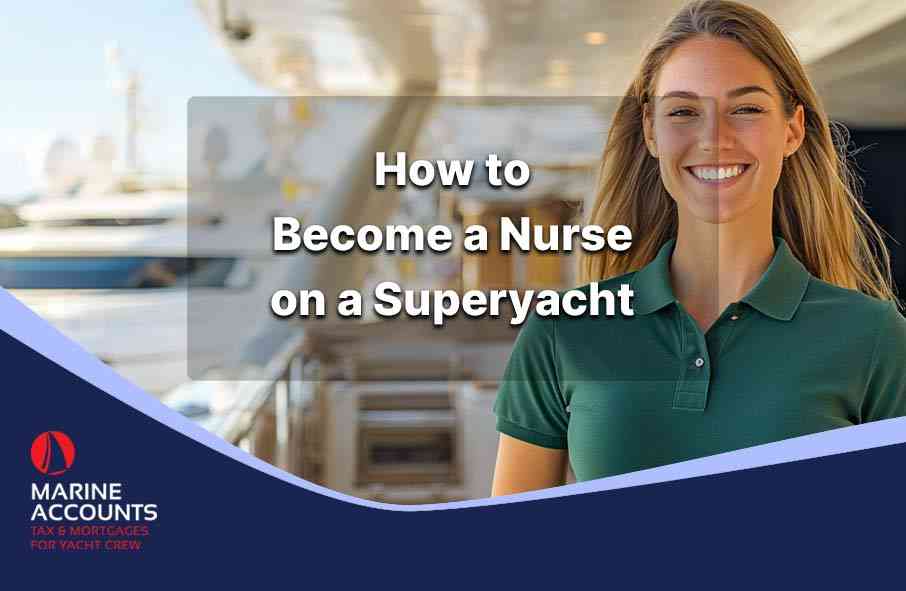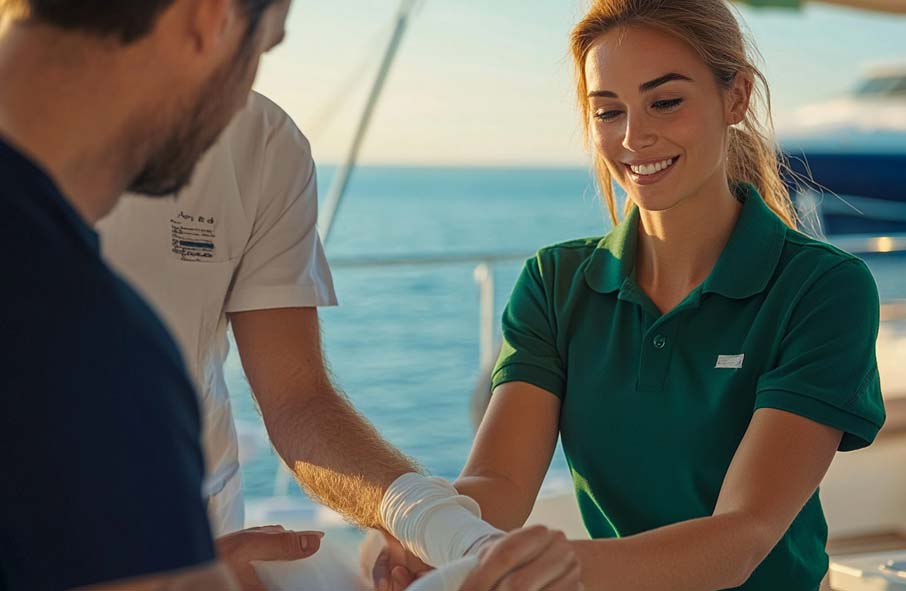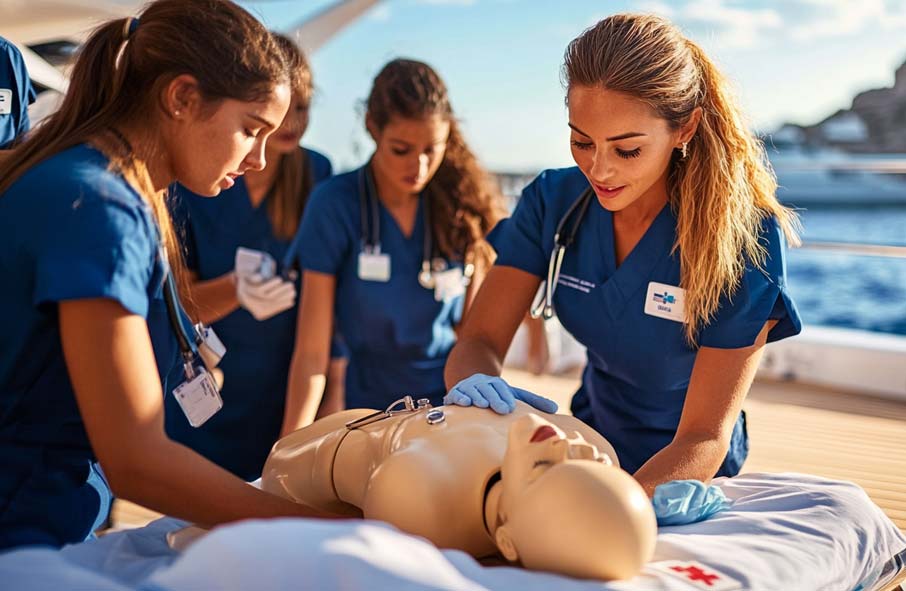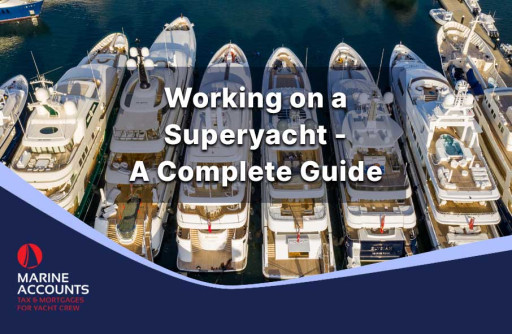How to Become a Nurse on a Superyacht
- Authors
-
-

- Name
- Patrick Maflin
-

Working as a nurse on a superyacht might sound like something out of a Hollywood movie.
A unique blend of medical professionalism and luxury travel, where your workplace might be the deck of a multimillion-pound vessel sailing through the Caribbean or the Mediterranean.
But for an increasing number of registered nurses, this isn’t just a fantasy.
It’s a real, viable career path that combines adventure with responsibility.
Yacht nurses, sometimes referred to as medical officers, are vital crew members who ensure the health and safety of both guests and crew aboard private or chartered yachts.
In a world where even the most remote destinations are within reach, the presence of a medical professional on board is often considered essential, especially on larger vessels with more than 12 crew or high-profile guests.
Whether you’re an experienced nurse craving change, or someone fascinated by the yachting industry and wondering how your skills might transfer to life at sea, this article will walk you through everything you need to know.
From the daily duties and earning potential to required qualifications and tax perks, we’ll cover all the essentials to help you decide if this unique lifestyle could be your next professional chapter.
Chapters
- What is a Yacht Nurse (Medical Officer)?
- What Does a Yacht Nurse Do?
- Required Skills and Experience
- Qualifications and Certifications
- Pros and Cons of Being a Yacht Nurse
- How Much Does a Yacht Nurse Earn?
- Tax Benefits of Becoming a Yacht Nurse
- How to Become a Nurse on a Yacht
- Conclusion
What is a Yacht Nurse (Medical Officer)?

A yacht nurse, also known as a medical officer aboard a superyacht, is a trained healthcare professional employed to care for the health and wellbeing of crew and guests while at sea.
Typically, yacht nurses are registered nurses with real-world clinical experience, often in emergency or intensive care settings, who bring their skills to the yachting world.
Depending on the size and type of vessel, the role can be dedicated entirely to medical duties or combined with another position, such as a stewardess or deckhand.
These hybrid roles are more common on smaller yachts, whereas larger superyachts or expedition vessels may have a dedicated medical officer.
What Does a Yacht Nurse Do?
The primary responsibility of a yacht nurse is to respond to any medical emergencies and provide day-to-day healthcare for both crew and guests.
Duties typically include:
- Administering first aid and emergency care.
- Monitoring chronic conditions (e.g. diabetes, hypertension).
- Managing seasickness, minor injuries, and illnesses.
- Stocking, inspecting, and maintaining the yacht's medical supplies.
- Assisting with wellness initiatives, such as fitness or nutrition plans.
- Liaising with onshore medical facilities and telemedicine services when needed.
On smaller yachts, the nurse may also support housekeeping, service, or deck operations during downtime from medical responsibilities.
Required Skills and Experience

To thrive in this environment, a yacht nurse must be adaptable, calm under pressure, and capable of working independently.
Seafaring comes with its own set of challenges, so the following attributes are essential:
- Strong clinical judgement and decision-making skills.
- Excellent communication and interpersonal skills.
- High levels of discretion and professionalism.
- Physical fitness and the ability to cope with long hours and irregular routines.
- Cultural awareness and a positive attitude in close-quarters environments.
Previous experience in high-pressure clinical settings, such as A&E or critical care, is highly desirable.
Employers look for candidates who can handle emergencies without immediate backup.
Qualifications and Certifications
To work as a nurse on a superyacht, several qualifications are required beyond your nursing degree and registration.
These typically include:
- Registered Nurse: Status in the UK (NMC) or an equivalent body if abroad.
- STCW Basic Safety Training: Mandatory for all seafarers, covering fire safety, sea survival, personal safety and social responsibilities.
- ENG1 Medical Certificate: Confirms your medical fitness to work at sea.
- Advanced First Aid or Proficiency in Medical Care Aboard Ship (STCW): Required for those who will take responsibility for onboard medical care.
- Yacht Interior or Hospitality Training (optional): Useful for those in hybrid roles (e.g., nurse/stewardess).
Having documentation in order and up to date is critical to gaining employment.
Pros and Cons of Being a Yacht Nurse
Like any specialist role, working as a nurse on a superyacht has unique benefits and drawbacks.
Pros
- Highly competitive tax-free salary (if qualifying, more below).
- Travel to some of the world's most beautiful destinations.
- Opportunities to work on state-of-the-art vessels.
- Close-knit working environment.
- Room and board included, leading to high savings potential.
Cons
- Long hours and limited privacy.
- Living and working with the same people for extended periods.
- Demanding guests and unpredictable schedules.
- Potential seasickness or isolation from shore-based support.
It is a role that combines the highs of luxury travel with the discipline of maritime service.
How Much Does a Yacht Nurse Earn?

Salaries for yacht nurses vary based on experience, vessel size, and the specifics of the role.
As of 2025, expected earnings are typically:
- Junior Nurse/Stewardess on smaller yachts: £2,500 to £3,500 per month.
- Experienced Registered Nurse on larger yachts: £4,000 to £6,000+ per month.
Some senior medical roles on exploration or expedition yachts with complex itineraries can exceed these figures, especially when responsibility for medical stock and crew health management is part of the brief.
These salaries usually include accommodation, food, uniforms, and sometimes even flights home.
Tax Benefits of Becoming a Yacht Nurse
One of the major financial advantages of working as a yacht nurse is the potential to earn tax-free income, depending on your country of residence and your seafaring status.
For British citizens, Seafarers' Earnings Deduction (SED) is a legal tax exemption scheme that can allow eligible crew to claim 100% income tax relief on foreign earnings.
To qualify, you must:
- Work on a ship (as defined by HMRC)
- Be outside the UK for at least 183 days in any 365-day period
- Be employed on a voyage that begins or ends outside the UK
For US citizens, the Foreign Earned Income Exclusion (FEIE) allows qualifying yacht crew to exclude a significant portion of their income from federal tax, provided they meet residence and physical presence tests.
Navigating these rules can be complex.
It is highly recommended that yacht crew work with a specialist seafarers' accountant who understands the nuances of maritime tax law and can help you remain compliant while maximising your take-home pay.
How to Become a Nurse on a Yacht
- Gain Experience Ashore: You will need at least a few years of clinical nursing experience in hospital settings, particularly in acute or emergency care.
- Obtain Maritime Certifications: Complete the STCW Basic Safety Training, secure your ENG1 medical, and take any additional courses (e.g., Proficiency in Medical Care) that elevate your CV.
- Prepare Your CV and Documents: Your yachting CV should include a professional photo, all qualifications, and a short summary of your medical and yachting background.
- Register with Yacht Crew Agencies: Work with reputable crew agencies like YPI Crew, Wilson Halligan, or Bluewater to get your CV in front of employers.
- Be Willing to Start Small: Many yacht nurses begin in dual roles or temp positions before securing permanent employment.
- Be Flexible and Positive: Show your willingness to muck in and be a team player, especially during trials or probation periods.
Conclusion
Becoming a nurse on a superyacht is a unique and rewarding career move for medical professionals seeking something different.
It allows you to use your nursing expertise while exploring the world in extraordinary comfort, and the earning potential is excellent, especially when you factor in minimal living expenses and possible tax-free income.
However, it requires commitment, resilience, and a proactive approach to training and certification.
Whether you are seeking adventure, professional development, or a new lifestyle, working as a yacht nurse can be an ideal next chapter in your nursing career.
As with any seafaring role, success begins with the right preparation and attitude.
If you are a qualified nurse with a sense of adventure and a desire to break away from the hospital routine, life at sea might just be your perfect prescription.
Disclaimer: Any advice in this publication is not intended or written by Marine Accounts to be used by a client or entity for the purpose of (i) avoiding penalties that may be imposed on any taxpayer or (ii) promoting, marketing or recommending to another party matters herein.






